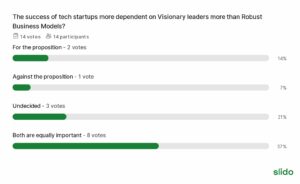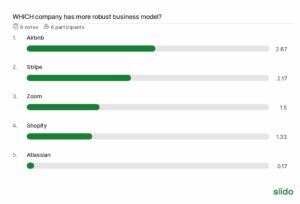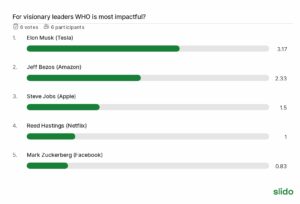On April 26, 2024, an illuminating debate took place at the in5 Tech space, a hub of innovation and entrepreneurship in Dubai. The event was spearheaded by Adil Tariq, the editor of T&I News, in collaboration with the vibrant 24six9 community, and great support by Crunch Dubai team.
The debate focused on an ever-pertinent question within the tech startup community: “What drives the success of startups more—visionary leadership or robust business models?”
This event attracted a diverse group of participants, ranging from budding entrepreneurs to seasoned investors, all eager to dissect and discuss the elements that truly propel a tech startup to success.
During an engaging exchange of ideas and experiences, a poll was conducted among the participants to capture their collective insight on this critical topic. The results of this poll offer a unique glimpse into the prevailing sentiments and strategies that define successful tech startups, both in the UAE and globally. The insights gleaned from this event are particularly valuable for anyone involved in or aspiring to enter the tech startup arena.
The Blueprint of Success: Visionary Leadership vs. Robust Business Models in Tech Startups

In the rapidly evolving tech sector, the debate between the importance of visionary leadership and robust business models continues to stir. The poll above if is used as a starting point, underscores a mixed but insightful perspective on what drives the success of startups like Airbnb, Stripe, and Zoom. Lets delve more into how the dichotomy of leadership vision and business strategy plays out across various successful tech companies.
Airbnb and Stripe: A Lesson in Agility and Innovation
Airbnb, with a rating of 2.67, and Stripe, close behind at 2.17, showcase two distinct paths to success in the tech arena. Airbnb’s model of transforming personal assets into revenue streams revolutionized the hospitality industry. Stripe, me

anwhile, simplified online transactions, empowering countless other startups and established businesses to monetize smoothly and efficiently. These examples highlight how innovative business models can rapidly scale with the right technological backbone.
Visionary Leaders: The Musk and Jobs Effect
Elon Musk and Steve Jobs are often heralded as quintessential visionaries whose leadership has dramatically transformed industries. With ratings of 3.17 and 1.5 respectively, their companies—Tesla and Apple—serve as prime examples of h

ow a leader’s forward-thinking approach can lead to groundbreaking innovations. Musk’s ventures into electric cars and space travel with SpaceX, and Jobs’ redefinition of personal computing and mobile phones, underscore the profound impact visionary leaders can have on their companies and the world at large.
The Debate: Leadership vs. Business Model
A recent poll involving tech industry participants sought to resolve the question of whether tech startups succeed more because of visionary leaders or robust business models. With 14 votes cast, the results were telling: 2 votes supported the importance of visionary leaders, 1 vote sided with robust business models, 3 remained undecided, and a significant majority of 8 votes believed both elements hold equal importance.
This indicates a broader consensus that while visionary leaders inspire and drive technological breakthroughs, robust business models are essential to sustain growth and adapt in a competitive market. The synergy of these elements offers a more comprehensive framework for enduring success in the tech sector.
A Symbiotic Relationship
The success stories of companies like Shopify, Atlassian, and tech giants such as Amazon and Facebook highlight the importance of marrying innovative leadership with strong business strategies. This alignment seems not just preferable but necessary for navigating the complex and fast-paced tech landscape.
For startups looking to carve out their space in the tech world, the takeaway is clear: cultivate visionary leadership while simultaneously building a business model that is adaptable, resilient, and scalable. This dual approach will likely pave the way for success in the unpredictable yet exciting tech frontier.
Expanding Horizons: Visionary Leadership and Robust Business Models in the UAE Tech Startup Ecosystem
The United Arab Emirates (UAE) has become a burgeoning hotspot for technology startups, with Dubai and Abu Dhabi at the forefront of fostering innovation. The region’s commitment to blending visionary leadership with solid business frameworks serves as a compelling model for startups worldwide. Lets explores how the UAE market exemplifies this synergy and offers insights for startups aiming to replicate this success.
UAE’s Pioneering Ventures: A Gateway to Innovation
In the UAE, companies like Careem and Souq have paved the way for how tech startups can thrive in a competitive market. Careem, which was acquired by Uber, started as a regional ride-sharing startup and expanded its services to become a broader logistics and transportation platform, showcasing the power of adaptive business models combined with visionary leadership. Souq’s acquisition by Amazon marked another success story, illustrating how robust business models can attract global tech giants.
Building on Success: The Role of Government and Incubators
The UAE government has played a crucial role in promoting tech entrepreneurship through initiatives like Dubai Future Accelerators and Abu Dhabi’s Hub71. These programs not only provide funding but also mentorship and strategic partnerships, creating a fertile ground for innovative ideas and sustainable business practices. Startups in these incubators are encouraged to adopt scalable business models while being driven by visionary leadership, mirroring the broader market’s dual approach.
Similarly, 24six9 community actively supports tech startups and leaders by providing a platform for networking, resources, and knowledge sharing. It fosters innovation and growth by connecting entrepreneurs with mentors, investors, and industry experts, empowering the next generation of visionary tech leaders.
Deep Dive into Recommendations: Nurturing Visionary Leadership and Robust Models
To further nurture the growth of tech startups in the UAE and beyond, it’s essential to focus on several core areas:
- Leadership Development: Programs tailored to developing leadership skills should be emphasized. Workshops, mentorships, and collaborations with established tech leaders can provide insights and foster the growth of new leaders.
- Innovation in Business Models: Encouraging startups to experiment with their business models can lead to innovative solutions. This could involve integrating advanced technologies like AI and blockchain to streamline operations and enhance service offerings.
- Building Resilience and Flexibility: It’s crucial for startups to build business models that are not only robust but also flexible enough to adapt to rapid market changes. This resilience can be cultivated through continuous market research and agile practices.
- Fostering a Supportive Ecosystem: Strengthening the network of investors, mentors, and strategic partners can help startups navigate early challenges and scale effectively. This includes enhancing access to capital, providing regulatory guidance, and creating networking opportunities.
Cultivating a Balanced Approach
The UAE’s tech sector demonstrates that the fusion of visionary leadership and dynamic business models is the cornerstone of startup success. As startups in the UAE and around the world continue to evolve, the emphasis on this balanced approach will likely be the key differentiator that defines the next generation of global tech leaders. By fostering environments that nurture both elements, the UAE sets a standard for how startups can flourish in the modern technological landscape.




